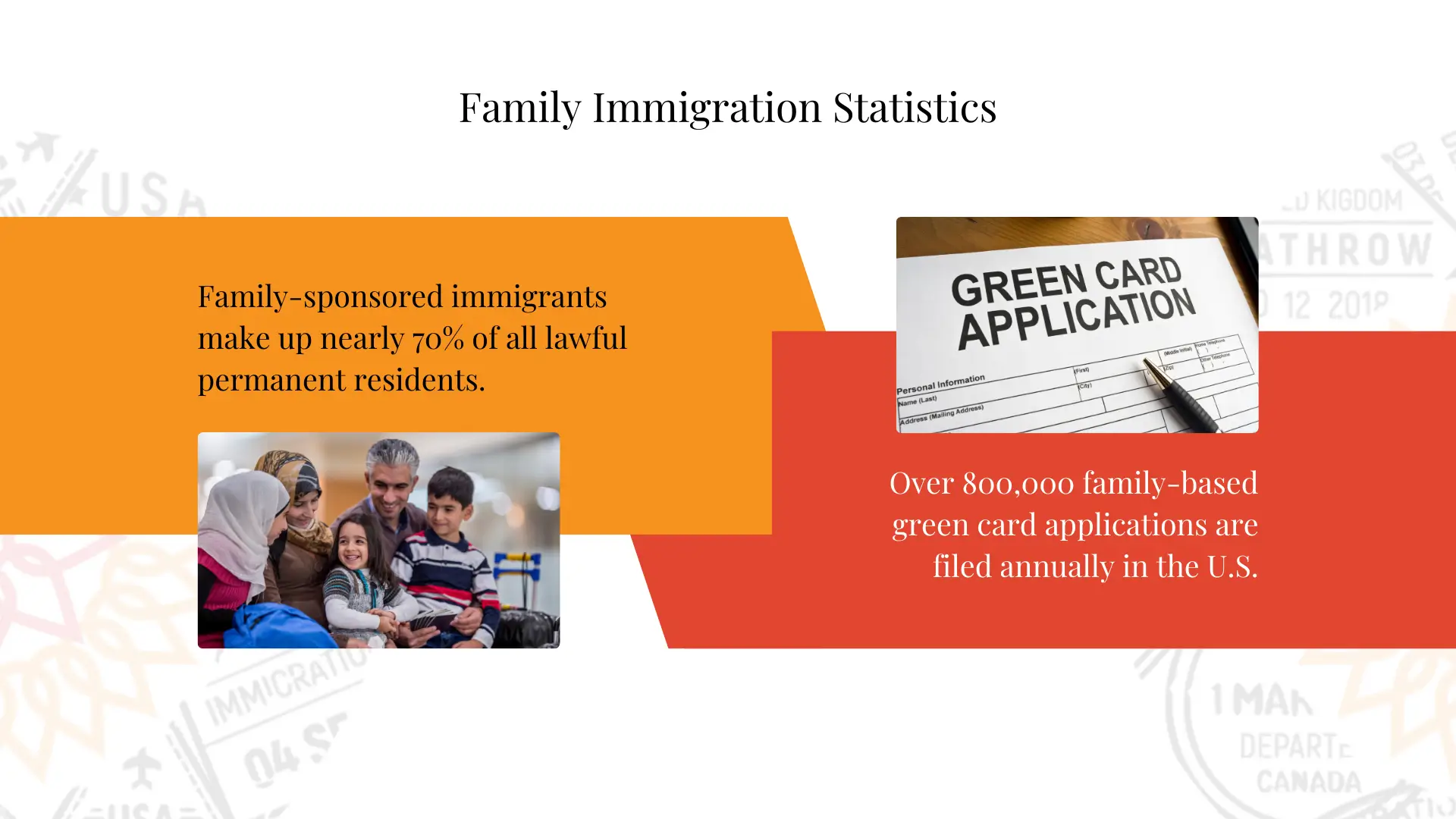Cambridge Law U.S. Marriage Immigration Lawyer
Family-based immigration is essential for keeping loved ones connected and ensuring that families can thrive together in the United States. At Cambridge Immigration Law, we provide legal expertise to help U.S. citizens and lawful permanent residents (LPRs) sponsor their children, parents, siblings, and other eligible family members for permanent residency or temporary status. Around 810,558 immigrants apply for family-based green cards each year, and all of those cases involved complicated, and often overwhelming, laws, rules, and procedures.We handle these cases every day, and we can help you. Our experienced team is here to guide you every step of the way.

How We Help with Family-Based Immigration
Each family’s immigration needs are unique, and our team of immigration lawyers work to ensure your applications are successful. From helping children and stepchildren secure visas to assisting grandparents, siblings, and other extended family members through family preference categories, we offer comprehensive legal services designed to avoid delays and denials.
Family preference visas are available for extended family members of U.S. citizens and lawful permanent residents. This includes categories such as adult children, siblings, and more distant relatives who do not qualify under immediate family categories.
Adjustment of status allows eligible individuals already in the United States to apply for permanent residency without returning to their home country. Key forms include:
Unmarried sons and daughters (21 years of age and older) of U.S. citizens;
Spouses and children (unmarried and under 21 years of age) of lawful permanent residents;
Unmarried sons and daughters (21 years of age and older) of lawful permanent residents;
Married sons and daughters of U.S. citizens; and
Brothers and sisters of U.S. citizens (if the U.S. citizen is 21 years of age and older).
Application to Register Permanent Residence or Adjust Status: This form is used to apply for a Green Card.
Petition for Alien Relative: Filed by U.S. citizens or permanent residents to establish the qualifying relationship.
Affidavit of Support: Demonstrates that the applicant has adequate means of financial support.
Report of Medical Examination and Vaccination Record: Establishes that the applicant is not inadmissible on health-related grounds.
For family members living abroad, we handle consular processing to secure immigrant visas through U.S. embassies or consulates. Our services include:
Our family immigration services extend to minor children, stepchildren, and adopted children of U.S. citizens and LPRs. We assist with completing petitions, documenting qualifying relationships, and applying for green cards or temporary status.
Certain family members of U.S. military personnel may be eligible for parole in place, allowing them to remain in the U.S. and apply for status adjustment. We help families take advantage of this program and avoid separation.
Family preference visas are available for extended family members of U.S. citizens and lawful permanent residents. This includes categories such as adult children, siblings, and more distant relatives who do not qualify under immediate family categories.
Adjustment of status allows eligible individuals already in the United States to apply for permanent residency without returning to their home country. Key forms include:
Unmarried sons and daughters (21 years of age and older) of U.S. citizens;
Spouses and children (unmarried and under 21 years of age) of lawful permanent residents;
Unmarried sons and daughters (21 years of age and older) of lawful permanent residents;
Married sons and daughters of U.S. citizens; and
Brothers and sisters of U.S. citizens (if the U.S. citizen is 21 years of age and older).
Application to Register Permanent Residence or Adjust Status: This form is used to apply for a Green Card.
Petition for Alien Relative: Filed by U.S. citizens or permanent residents to establish the qualifying relationship.
Affidavit of Support: Demonstrates that the applicant has adequate means of financial support.
Report of Medical Examination and Vaccination Record: Establishes that the applicant is not inadmissible on health-related grounds.
For family members living abroad, we handle consular processing to secure immigrant visas through U.S. embassies or consulates. Our services include:
Our family immigration services extend to minor children, stepchildren, and adopted children of U.S. citizens and LPRs. We assist with completing petitions, documenting qualifying relationships, and applying for green cards or temporary status.
Certain family members of U.S. military personnel may be eligible for parole in place, allowing them to remain in the U.S. and apply for status adjustment. We help families take advantage of this program and avoid separation.

Why Legal Guidance Matters in Family Based Immigration
Family-based immigration cases can be complex, especially when dealing with priority dates, extended family relationships, or waivers of inadmissibility. Mistakes in documentation or missteps in the application process can lead to significant delays. Our experienced team of family immigration attorneys provides the following support:
We handle key forms like Form I-130, I-485, I-693, and I-864 to ensure your application is complete and accurate.
We gather proof of family relationships, cohabitation, and financial support to support your case.
If issues arise, we represent you in navigating additional reviews, waivers, or interviews.
We work with U.S. citizens to help elderly or dependent parents secure visas and establish long-term residency through proper documentation and support.
Family members of U.S. military personnel may qualify for special benefits, such as expedited processing or parole in place. We guide military families through these options to minimize the risk of separation.
We guide families through unique scenarios, including the sponsorship of stepchildren and children in cases where one parent is deceased or unavailable.
We also work with families who face exceptional circumstances, such as those eligible for VAWA (Violence Against Women Act) protections, humanitarian parole, or waivers of inadmissibility. Our team ensures that these sensitive cases are handled with precision, care, and confidentiality, helping clients overcome legal obstacles and achieve family reunification.
Frequently Asked Questions
Q: Can I sponsor my adult children for a family-based visa?
Yes, U.S. citizens and LPRs can sponsor their unmarried or married adult children, but processing times will depend on the family preference category.
Q: What documents do I need to prove a qualifying family relationship?
Proof includes birth certificates, marriage certificates (if applicable), adoption records, and affidavits from relatives.
Q: How long does it take for a parent to obtain a green card?
If applying through consular processing or adjustment of status, the process generally takes 12 to 18 months for parents of U.S. citizens.
Q: Can extended family members, like aunts and uncles, be sponsored?
No, family preference categories do not typically allow for direct sponsorship of extended family like aunts or uncles. However, there may be alternative routes such as derivative benefits for dependents.
Blogs

Family-based immigration is a pathway to reunite with loved ones and build a new life in the United States. Understanding the requisite forms and navigating the application process is vital for a successful journey. Here, we break down the essential forms and offer tips to ensure a seamless experience.

The United States offers several family-sponsored visa categories (F-1, F-2A, F-2B, F-3, and F-4) that allow U.S. citizens and lawful permanent residents to bring their family members to the country. Each category has specific eligibility criteria and unique features, making it essential to understand the differences to determine which one suits your situation best. Let’s delve into these categories to shed light on their eligibility and distinctions.

Congratulations on your marriage! Now what happens if you are a U.S. citizen and your spouse is foreign? You likely want to petition for your spouse be “get a green card” either by coming to the U.S. or applying for a green card from within the US. to the U.S. as a permanent resident. As part of that “green card” application, you will also need to show that your marriage is “real.” Real? You may be wondering what on earth a “real” marriage is.
Read More


Contact us today for a consultation.